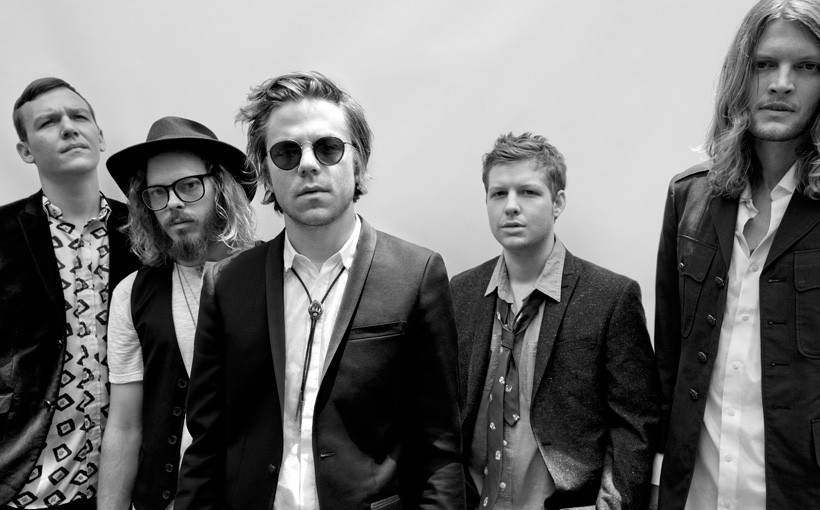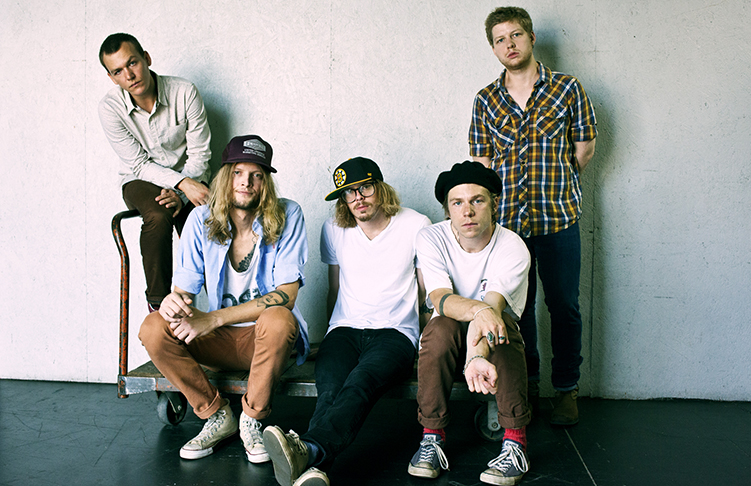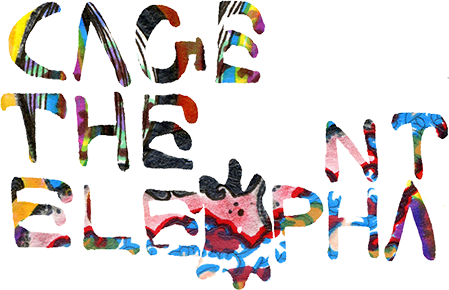Music critics who have witnessed the eye-popping spectacle that is a Cage the Elephant live performance have likened the band’s singer to many things, among them “a demented Bible Belt preacher,” “a Tasmanian devil whooping and jumping up and down like a frenzied gibbon.” And that’s just frontman Matt Shultz. The verdict? “Exhilarating, 100 mph stuff,” raved British indie music bible NME about one of the group’s UK gigs last fall.
Cage the Elephant’s raucous live show — which made this red-hot Kentucky-bred band the talk of this year’s South-by-Southwest music festival, and led USA Today to single them out as a band not to miss at 2009’s Coachella Valley Music and Arts Festival — is the perfect showcase for their buzzed-about self-titled debut album for Jive Records. Recorded over 10 days with Grammy Award-winning producer Jay Joyce, and a Top 40 hit when it was released on British indie label Relentless in the U.K. last June, the album is a genre-defying blend of rock n roll and raw youthful punk energy all propelled by Matt’s taunting, Dylan-esque rhythmic vocal delivery, Brad Shultz and Lincoln Parish’s furious twin guitar assault, and bassist Daniel Tichenor and drummer Jared Champion’s rock-steady funk grooves.
“The music comes from a pure place,” Matt says. We really like the energy of music that feels passionate, raw, unplanned emotion. That's what we were really trying to capture in the studio.”

And although the grooves are designed to make you move, there’s more going on in these punk funk tunes than the reckless abandonment that first meet the ear. Lyricist Matt tells stories about his life. The first single off of the album is “Ain’t No Rest for the Wicked,” in which Matt describes being mugged by a drug dealer and picking up a young female hitch-hiker he soon finds out is a prostitute. “That song is about realizing that everyone’s got a back-story and that essentially we’re all the same,” he says. “It doesn’t matter if you’re a priest, a coke dealer, or a prostitute; we all struggle with the same things, so how can we sit in judgment of others when each of us has something in our closet that we’d never tell anyone.”
Or like his experience dealing with shady s***-talkers on the instantly addictive track “In One Ear” (sample lyric: “They say I’m just a stupid kid / another crazy radical / rock n’ roll is dead / I probably should have stayed in school / Another generation X / who somehow slipped up through the cracks / Oh they’d love to see me fall / But I’m already on my back”), then tackles corruption and hypocrisy on “James Brown” and religion and war on “Lotus.”
Throughout the album’s 11-song cycle, Matt’s frustration with society is readily apparent. “But mostly you can hear the frustration I have in myself,” he says. “Like why did I buy into certain things the world has sold me? That’s where I was coming from when I wrote the songs — just looking at the world and realizing it’s full of hypocrites and I’m one too.”
Given Matt’s background, it’s not surprising that such searching subject matter would find its way into Cage the Elephant’s songs. The band members hail from Bowling Green, Kentucky — a town where working in the nearby Chevrolet assembly plant or Fruit of the Loom headquarters were the main employment games in town. “It was the kind of place where if you didn’t play football, or you were a little bit different, people thought you were gay,” Matt says. "I didn’t want to be part of that jock world. I liked music so I quit the football team when I was a junior and started a band. Forming Cage the Elephant was a rebellious thing — a way for us to carve out our own path instead of following the path created by the community that surrounded us.”

The Shultz brothers grew up poor, sharing a tiny room in the family’s two-bedroom apartment with two other siblings. “Our dad drove a supply truck and he was gone a lot,” Matt recalls. “There wasn’t a lot of money or anything to do so we would make up goofy songs to pass the time.” At age 12, Brad bought a beat-up guitar from a neighborhood kid for $20 that he played until it literally fell apart. Not long after their parents were divorced, Brad snuck home a cassette of Jimi Hendrix’s Live at Woodstock, which the brothers listened to obsessively for three years, cementing their love for rock and roll. A few years later, Matt bought Bob Dylan’s The Times They Are a-Changin’. “That was a huge, life-changing album for me.” he says. “Just the honesty in Dylan’s music and how he looked at society, it really opened my eyes to how blind we really are.” After the brothers’ parents divorced, the music floodgates opened and they began to devour everything they could find from the Beatles, The Ramones, Led Zeppelin, Chuck Berry, the Rolling Stones, Nirvana, and the Pixies, to name but a few.
“A lot of bands put themselves in a box and say, ‘We're not going to be influenced by anything,’ Matt says. “We don’t mind being influenced though. I don't think you should force influence but to fight against it would be like fighting against nature. You have a responsibility to innovate but a lot of the time people allow pretentiousness to taint their innovation and what you end up with is very contrived soulless music. Everything we love about music we wanted to put in our own music. When it comes down to it, we just want to make music that we love.”
